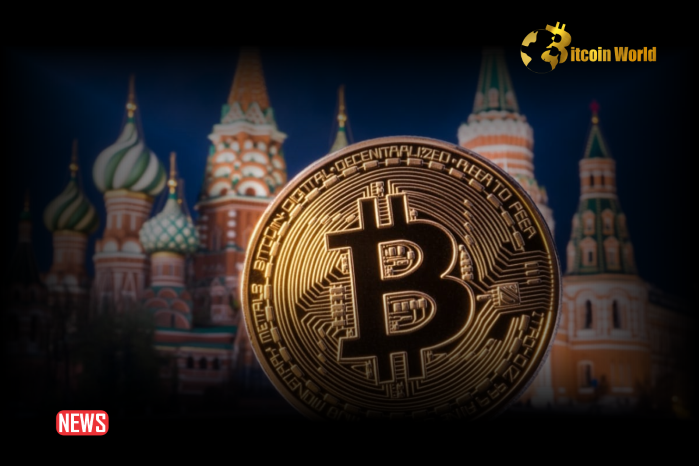In a significant move to navigate economic challenges and bolster international trade, Russia is reportedly setting up not one, but two new cryptocurrency exchanges. Yes, you heard that right! As the global landscape of digital finance evolves, Russia is stepping up its game, aiming to leverage crypto for foreign trade. But what does this mean, and is it all smooth sailing ahead? Let’s dive into the details.
Why is Russia Launching Crypto Exchanges?
The core reason behind this initiative is to facilitate and support Russia’s foreign trade activities. According to reports from Kommersant, Russian authorities are actively exploring the establishment of two crypto exchange platforms. One of these exchanges is planned to be based on the existing St. Petersburg Currency Exchange, while the other is slated for Moscow.
🇷🇺Russia plans to launch two crypto exchanges, one in Moscow and another in St. Petersburg, to help support foreign trade. https://t.co/8V0aYhVPAc
— Wu Blockchain (@WuBlockchain) February 12, 2024
This strategic move comes as Russia seeks alternative financial avenues amidst international sanctions and aims to strengthen its economic ties with countries willing to engage in crypto-based transactions. The exact operational framework for the Moscow exchange is still under consideration – whether it will be integrated with the existing Moscow Exchange or operate independently under special legal regulations remains to be seen.
What About Stablecoins? A New Digital Ruble on the Horizon?
But wait, there’s more! Beyond just exchanges, Russia is also considering the introduction of a stablecoin. This isn’t just any stablecoin; it’s proposed to be pegged to the Chinese Yuan (RMB) and potentially linked to the BRICS currency basket. This ambitious plan underscores Russia’s intention to diversify its cryptocurrency offerings and deepen financial partnerships with key global economies, particularly within the BRICS nations.
Imagine a stablecoin that bridges the gap between traditional currencies and the crypto world, potentially streamlining transactions and reducing reliance on traditional financial systems. However, experts like Oleg Ogienko, CEO of BitRiver, point out potential hurdles.
- Convertibility Challenges: Ensuring seamless conversion between the stablecoin and other assets is crucial.
- Liquidity Concerns: Maintaining sufficient liquidity for the stablecoin to function effectively in trade is paramount.
Ogienko also highlights the legal classification of stablecoins in Russia. Under Russian law, stablecoins are categorized as digital financial assets, which means they are recognized and regulated, but also come with the requirement of an issuing entity responsible for maintaining their value.
How Will These Crypto Platforms Actually Work?
Here’s the inside scoop: these new crypto exchanges and stablecoin initiatives are expected to function under an experimental legal regime. Think of it as a sandbox environment where Russia can test, refine, and adapt its approach to cryptocurrency regulation in real-time.
Initially, access to these platforms might be restricted to:
- Large Businesses: Facilitating significant international trade volumes.
- Key Economic Players: Strategic entities involved in Russia’s financial ecosystem.
The plan is to gradually expand access to smaller businesses and eventually individuals, as the systems prove their robustness and regulatory frameworks become clearer.
Are There Risks Involved? The Shadow Side of Crypto Exchanges
While the prospect of new crypto exchanges and stablecoins sounds promising, it’s crucial to acknowledge the potential pitfalls. Experts caution that while these developments could inject new energy into Russia’s crypto market, risks are inherent. One significant concern revolves around transparency.
Transparency and Scrutiny: Blockchain’s inherent transparency, while a benefit in many ways, could also be a double-edged sword. Every transaction is potentially traceable, which could expose Russia’s trade activities to international scrutiny. This increased visibility might, ironically, lead to heightened risks of sanctions or restrictions, especially in the current geopolitical climate.
Will These Exchanges Be Popular? Trust and Adoption Challenges
Another critical question is adoption. Will Russian businesses and individuals flock to these new domestic crypto exchanges? Nikita Vassev, founder of TerraCrypto, raises a valid point: most users might prefer well-established international platforms unless they are compelled to use the domestic alternatives due to limitations or restrictions.
Trust Deficit: Centralized exchanges, by their nature, require a degree of trust. Vassev suggests that trust levels in these new, potentially state-backed exchanges might be lower compared to decentralized or globally recognized platforms. Overcoming this trust deficit will be crucial for the success and widespread adoption of these new Russian crypto exchanges.
Key Takeaways: Navigating the Crypto Frontier
Russia’s foray into launching two crypto exchanges and exploring stablecoins represents a bold step towards leveraging digital assets for foreign trade. Here’s a quick recap of the key aspects:
- Strategic Move: Aimed at supporting foreign trade and navigating economic sanctions.
- Two Exchanges: One in Moscow, one in St. Petersburg, with potentially different operational models.
- Stablecoin Ambitions: Exploring a Yuan-pegged stablecoin and BRICS currency basket linkage.
- Experimental Regime: Operating initially under a test legal framework, starting with large businesses.
- Risks and Challenges: Transparency concerns, potential for international scrutiny, and the need to build user trust.
Ultimately, the success of these initiatives will hinge on navigating regulatory complexities, building trust, and demonstrating tangible benefits for users. Will Russia’s crypto gamble pay off? Only time will tell, but one thing is certain: the world of digital finance is watching closely.
Disclaimer: The information provided is not trading advice, Bitcoinworld.co.in holds no liability for any investments made based on the information provided on this page. We strongly recommend independent research and/or consultation with a qualified professional before making any investment decisions.




